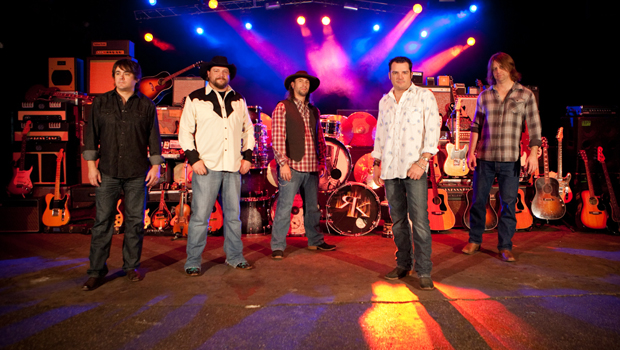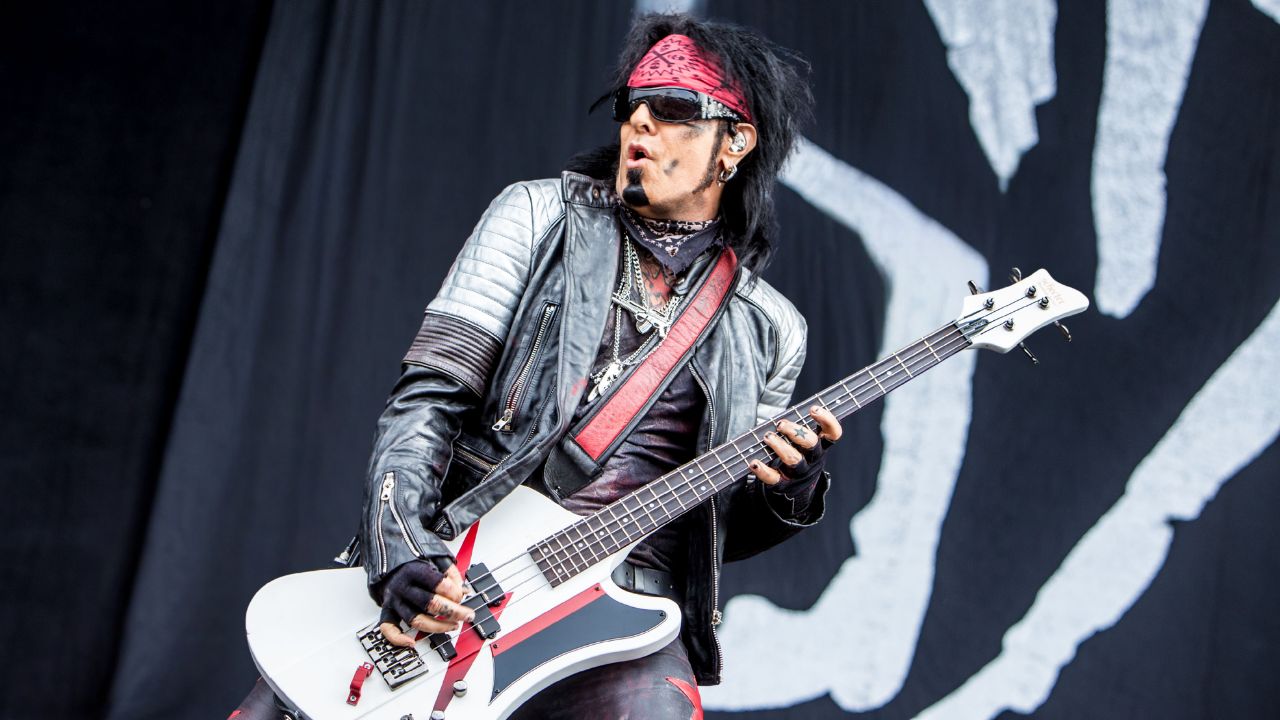Interview: Guitarist David Abeyta Discusses New Reckless Kelly Album, 'Good Luck and True Love'
All the latest guitar news, interviews, lessons, reviews, deals and more, direct to your inbox!
You are now subscribed
Your newsletter sign-up was successful

Austin-based country band Reckless Kelly’s new album, Good Luck and True Love, might also be an appropriate title for its lead guitarist’s career.
David Abeyta attended Berklee College of Music to determine if he had what it takes to make it as a guitarist.
“I thought, ‘If I can do this, then I’ll keep at it,'" Abeyta says. “I used it as my measuring stick, which may or may not have been a good idea. Luckily, it worked.” Abeyta checked in before a show in Boston to talk about the new album, his favorite gear and getting his start in a ukulele band.
GUITAR WORLD: What kind of response has your new album, Good Luck and True Love, been getting?
It’s been good. The previous record was all songs by Pinto Bennett, who Willy and Cody, our singer and fiddle player, grew up idolizing. That was really well received, but I think people were ready for another record of originals. So it’s kind of back to business as usual, and it’s been nice to make forward progress with another Reckless Kelly record.
This was the first album you released on your own label, No Big Deal Records. What was that like?
I think it was different from the Sugar Hill days, but no so different from the Yep Roc days, if that makes any sense. With Sugar Hill, we had to deal really closely with the A&R guy. There was more oversight, and it felt more like turning the record in. Yep Roc was a lot looser with letting us produce our own record and do what we were going to do. It was pretty similar to the Yep Roc experience, because we had the freedom to self-produce. The three of us that produced the record, Willy, Cody and myself, each have our own little departments. Mine tends to be the sonics — the gear and the geeky studio end of it. Willy writes the songs and messes with arrangements, and Cody deals with logistics. We’ve always been about doing things our own way, and with the recording industry changing so much; it just made a lot of sense.
All the latest guitar news, interviews, lessons, reviews, deals and more, direct to your inbox!
What is your biggest point of pride on the new album?
I’m proud of the way it sounds. I think we get better and better at capturing the band’s sound as we go. I guess that’s the idea, though. I’m particularly happy with the guitar tone. Every time, I feel like I get a little closer to capturing the tone I hear in my head. Over the years, we’ve gone back to using ribbons and doing different things to try to get a more accurate guitar sound. So I think I’m as pleased with the guitar tones on this album as I’ve ever been. I guess that means we’re headed in the right direction. My main concern is always to make the record sound as cool as we possibly can. We all have our favorite records, and we always try to make something that sounds like those records that we really love.
What album is that for you?
I always joke that we’re trying to make Revolver. It’s got some great aggressive guitar tones, and you can hear pressure being put on the microphone, or an AC30 that sounds like it’s about to blow up. Those are some of my favorite little weird things about albums. We always try to throw a few of those things in there.
Is there anything about the album you wish you could change?
I don’t think there is, actually. The only things I would change were just little hiccups that worked themselves out during mastering. Certainly there’s nothing I would change about the way the album turned out — I’m really pleased with it. If you’d asked me that question four records ago, my answer would’ve been completely different. I had a little bit of a perfectionist streak, but I think I’ve been able to outgrow that. Once you give birth to the record, you just have to let go and try to hear it from a listener’s standpoint.
Are you playing a lot of the new material on tour?
We’re doing roughly half the record every night. A lot of the fans want to hear some of the older stuff that we’ve left out, and we’ve heard about it at the merch table afterward. So, it’s a real balancing act to try to play the new stuff and still play the songs that people want to hear.
Did you write most of the songs in the studio? Or did they get a chance to evolve on stage first?
This time, they didn’t evolve on stage at all. Willy Braun does all of the writing, and he brought the material in, and we rehearsed on what was supposed to be our days off from the road. So, we rehearsed and worked out arrangements, and then we started recording. The arrangements were pretty much intact by the time we got there, so it was really just a matter of getting in there and figuring out which one was the take. The band prefers it that way, too. I try to walk that line of making sure everyone’s not rehearsed to the point of having nothing spontaneous about the performance. I think we struck a good balance.
What’s your favorite song from the album to play live?
The one guitar-driven rocker on the record, “Hit the Ground Runnin,’” was kind of rocked out at the end anyway, so that one is a little open-ended live. I like the way it turned out on the record, and I enjoy playing it live as our opener. Willy comes out and plays some traveling blues by himself, and we walk out on stage one at a time and pick up that tune. There’s not a lot of that on this record, so that’s the one real solo-oriented song. That’s such an obvious answer for the guitar player to like the one guitar tune, but it’s got great energy.
You’re on tour now with Willy and Cody’s younger brothers’ band, Micky and the Motorcars. What’s it like being on the road with four Braun brothers?
It’s a lot of fun. Since they’ve been a band, we’ve done a lot of shows together, and I enjoy getting to see those guys every day, because they’re a lot of fun. But, I think the fans really enjoy getting to see four Braun brothers every night. Both bands live in the same area sound-wise, so people feel like it’s a good double bill. Micky and Gary will come out and do a few songs that they’ve written together. It feels like a treat for the fans.
How did you get started playing guitar?
I started playing ukulele when I was 4. A guy in my neighborhood had a ukulele band. There were all these different parts, and some of the older kids would play baritone, and the younger kids would play a regular ukulele. We would learn these single-note lines, which were written out in standard notation, and everybody had their own part. It was like a little ukulele orchestra. It was a pretty cool opportunity for me to start playing, and I took to it pretty quickly. When I got older, I moved on to a baritone, and when I got a little older, I moved on to a guitar. I just kept going on from there. I went to Berklee College of Music in ’87. That was a huge turning point for me. I graduated in ’90, and ended up meeting up with these guys in Austin.
Do you remember your first guitar?
My first guitar was just a no-name sunburst acoustic, and I had my doubts as to whether the top was really made of wood. I don’t think it even had a name on the headstock. Once I showed I was really into it, my mom took me down to the store and bought me a Sigma Martin. Then, I got some kind of Sears electric. Not a Silvertone, but some other kind of Strat knock-off.
What is your rig like now?
For the last couple of years, I’ve been playing with Divided by 13 amps. I use the SJT 10/20 — it’s a little 20-watter. Our stage volume has gone down more and more, so I’ve moved to a smaller rig. It’s that 20-watt head and a 1x12 cabinet most nights, unless we’re outdoors. Then I’ll use a 2x12 Matchless cab that I have. That’s my main amp on the road. On the board, I’m pretty simple: I use an Analogman King of Tone and a ZVex Super-Duper-2-in-1 clean boost. I’ve also been using a Strymon El Capistan tape-delay emulator. I use delay a lot. I almost always have a short slap effect.
What about guitars? Do you usually stick with a Telecaster?
I do. The one that’s on most of the record was done by Gamble Guitar Works. I had an old Fender that was covered in that horrible photo flame finish. It was really bad, so he took all that off and refinished it to model it after a Tele that a buddy of mine had growing up that I always coveted. We put a banana-pudding finish on it, and put a new neck on it, so it turned into sort of a Frankenstein guitar. I also have a ’62 reissue Strat that I’ve had since 1986. It’s starting to look like the real thing with all the wear on it. I also carry a ’61 reissue Gibson SG that I use for the humbucker stuff.
Who inspired you to become a lead guitarist?
The lead guitar thing that really got me and wouldn’t let go was Stevie Ray Vaughan. When I was in high school, he’d come through Tulsa, where I grew up, and we’d go see him. He blew my mind. I started working backwards after that, so that took me to Hendrix, and I worked my way back through the blues. I was definitely bit by the lead-guitar bug at that point. As I worked forward from there, I found guys like Robben Ford, John Scofield, Bill Frisell and Pat Metheny, and I totally immersed myself in that. I think Robben Ford is my biggest influence today.
Reckless Kelly has been at it for 15 years, and you’ve been with them for 12. What’s the biggest thing you’ve learned from playing with the band for such a long time?
It might sound a little cliché, but you have to stay true to the music. You have to be true to how you hear things and how you want the record and your shows to turn out. We’ve always put that ahead of everything else. You can only please other people when you’re pleased with yourself.
